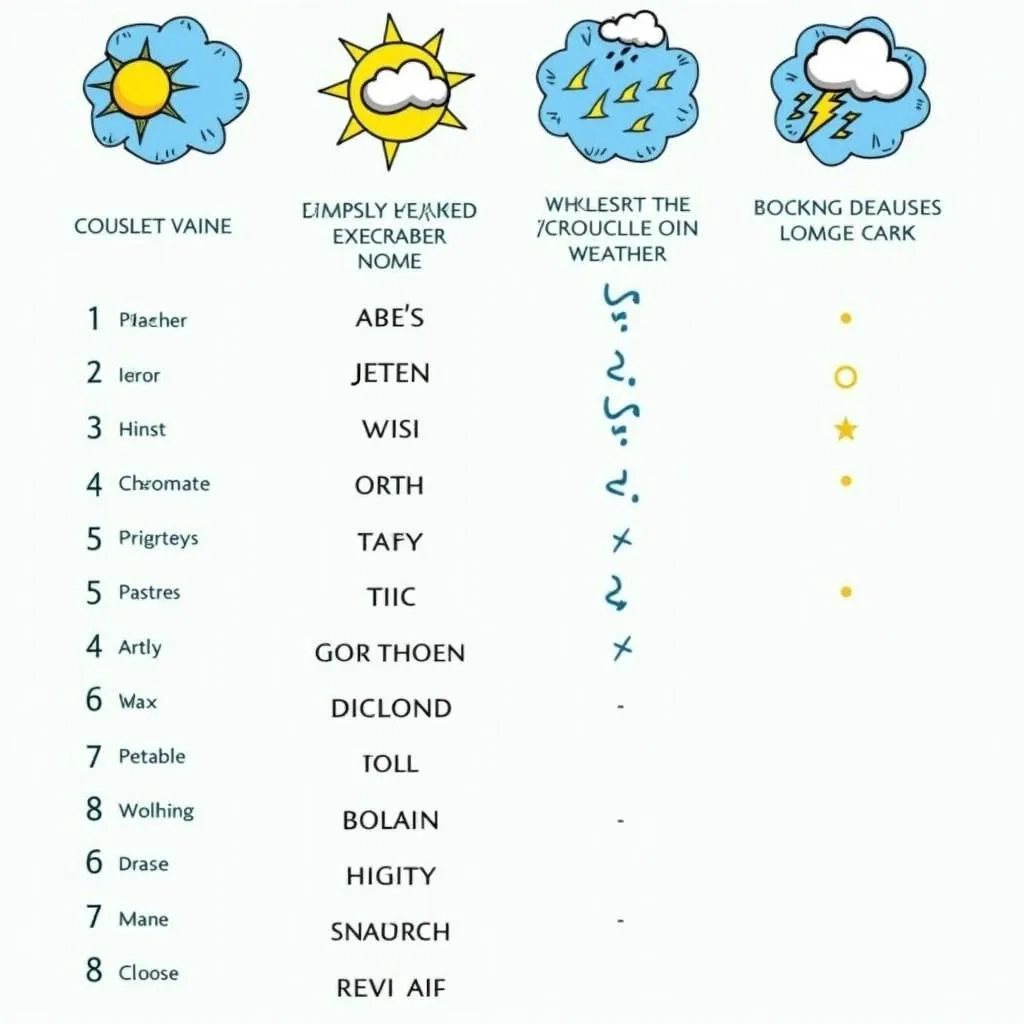Weather and climate are common topics in IELTS Speaking tests, particularly in Part 1. The ability to describe weather conditions and personal preferences can significantly impact your score. This article will guide you through answering questions about your favorite weather or climate, providing sample answers for different band scores and essential vocabulary to help you excel in your IELTS Speaking exam.
Part 1: Introduction and Interview
In this section, the examiner may ask you questions like:
- What’s your favorite season? Why?
- Do you prefer hot or cold weather?
- How does the weather affect your mood?
- What kind of weather do you like for outdoor activities?
Let’s focus on the question: “What kind of weather or climate do you like?”
Sample answer (Band 7-8):
“I’m particularly fond of mild spring weather. I enjoy temperatures around 20°C with a gentle breeze and clear blue skies. This type of climate allows me to comfortably spend time outdoors without feeling too hot or cold. It’s perfect for activities like picnics in the park or leisurely walks in nature.”
Part 2: Long Turn
Cue Card
Describe the weather or climate you like
You should say:
- What kind of weather or climate it is
- Why you like it
- How it makes you feel
- What activities you enjoy in this weather
 Ideal weather and climate description for IELTS Speaking
Ideal weather and climate description for IELTS Speaking
Sample Answer (Band 6-7)
“The weather I particularly enjoy is warm and sunny, typically found in late spring or early summer. I prefer temperatures around 20 to 25 degrees Celsius, with clear blue skies and a gentle breeze.
I like this type of weather because it’s neither too hot nor too cold. It allows me to spend time outdoors comfortably without feeling uncomfortable or needing to wear too many layers of clothing.
This kind of weather makes me feel energized and positive. The warmth of the sun and the fresh air boost my mood and make me feel more productive and motivated.
In this weather, I enjoy various activities. I love going for walks in the park, having picnics with friends, or simply sitting outside to read a book or enjoy a cup of coffee. It’s also great weather for outdoor sports like tennis or cycling. Overall, this type of climate allows me to make the most of my free time and enjoy nature to its fullest.”
Sample Answer (Band 8-9)
“I have a particular affinity for what I’d describe as quintessential Mediterranean climate – warm, sunny days with temperatures hovering around 22 to 26 degrees Celsius, accompanied by crystal-clear azure skies and a refreshing sea breeze.
This climate appeals to me for several reasons. Primarily, it strikes the perfect balance between warmth and comfort, allowing for a wide range of outdoor activities without the discomfort of extreme temperatures. Moreover, the consistent sunshine has a profoundly positive impact on my psychological well-being.
In such weather conditions, I experience a palpable sense of vitality and optimism. The gentle warmth of the sun seems to invigorate my senses, while the fresh, crisp air invigorates my mind. It’s as if the pleasant climate acts as a natural antidepressant, elevating my mood and enhancing my overall outlook on life.
This ideal weather opens up a plethora of enjoyable activities. I’m particularly fond of embarking on scenic coastal hikes, where I can revel in the breathtaking vistas of the sun-dappled sea. Alternatively, I find great pleasure in leisurely al fresco dining, savoring local cuisine while basking in the warm sunlight. For more active pursuits, I enjoy partaking in water sports such as kayaking or paddleboarding, making the most of the calm seas typical of this climate. Ultimately, this type of weather provides the perfect backdrop for creating lasting memories and fully appreciating the natural world around us.”
Follow-up Questions
- How does climate change affect the weather in your area?
- Do you think people’s preferences for weather change as they get older?
Sample answer for question 1 (Band 8-9):
“Climate change has had a significant impact on the weather patterns in my region. We’ve been experiencing increasingly erratic weather conditions, with more frequent extreme events such as heatwaves, prolonged droughts, and unusually heavy rainfall. Winters have become milder, while summers are noticeably hotter. These changes have led to shifts in local ecosystems and agricultural practices, necessitating adaptation strategies for both wildlife and human communities. It’s a stark reminder of the global implications of climate change and the urgent need for collective action to mitigate its effects.”
Part 3: Two-way Discussion
Examiner: How do you think different types of weather affect people’s behavior?
Sample answer (Band 7-8):
“I believe weather has a significant influence on people’s behavior and mood. Sunny weather often makes people feel more energetic and optimistic, leading to increased outdoor activities and social interactions. In contrast, rainy or gloomy weather might make people feel more lethargic and introspective, possibly causing them to stay indoors more.
Extreme weather conditions like heatwaves or severe cold can also affect people’s routines and decisions. For instance, during a heatwave, people might seek out air-conditioned spaces or change their working hours to avoid the hottest part of the day. In very cold weather, people tend to bundle up and spend less time outside.
Moreover, weather can impact consumer behavior. Sunny weather might boost sales for certain products like ice cream or outdoor equipment, while rainy weather could increase online shopping as people prefer to stay at home.
Interestingly, studies have shown that weather can even affect cognitive performance. Some research suggests that optimal cognitive functioning occurs at moderate temperatures, with extreme heat or cold potentially impairing concentration and decision-making skills.
Overall, I think the impact of weather on behavior is quite complex and multifaceted, influencing not just our activities but also our mood, productivity, and even our cognitive abilities.”
Describe a place where you had a peaceful and relaxing experience can often be related to ideal weather conditions, as pleasant weather contributes significantly to a relaxing atmosphere.
Key Vocabulary and Phrases
-
Mild /maɪld/ (adjective): Not extreme or severe; moderate.
Example: “I prefer mild temperatures, neither too hot nor too cold.” -
Balmy /ˈbɑːmi/ (adjective): Pleasantly warm.
Example: “The balmy evening air was perfect for a stroll along the beach.” -
Crisp /krɪsp/ (adjective): Cool, fresh, and invigorating (often used for autumn air).
Example: “I love the crisp air of early autumn mornings.” -
Scorching /ˈskɔːrtʃɪŋ/ (adjective): Very hot.
Example: “The scorching summer heat made outdoor activities challenging.” -
Overcast /ˌəʊvəˈkɑːst/ (adjective): (Of the sky or weather) Cloudy or dull.
Example: “The overcast sky threatened rain all day.” -
Climate /ˈklaɪmət/ (noun): The weather conditions prevailing in an area in general or over a long period.
Example: “The Mediterranean climate is characterized by mild, wet winters and hot, dry summers.” -
To acclimatize /əˈklaɪmətaɪz/ (verb): To become accustomed to a new climate or new conditions.
Example: “It took me a few weeks to acclimatize to the humid tropical weather.” -
Meteorological /ˌmiːtiərəˈlɒdʒɪkl/ (adjective): Relating to the branch of science concerned with the processes and phenomena of the atmosphere, especially as a means of forecasting the weather.
Example: “The meteorological data suggested we were in for a spell of good weather.”
 Weather vocabulary for IELTS Speaking
Weather vocabulary for IELTS Speaking
Describe a time when you had to deal with a stressful situation might involve discussing how weather conditions contributed to or alleviated stress in certain scenarios.
Examiner’s Advice
To achieve a high score in the IELTS Speaking test when describing weather or climate:
- Use a variety of descriptive adjectives to paint a vivid picture of your preferred weather conditions.
- Explain your preferences in detail, providing reasons and examples.
- Discuss how the weather affects your mood and activities to demonstrate a deeper understanding of the topic.
- Use idiomatic expressions related to weather appropriately to showcase your language proficiency.
- Practice speaking about different weather conditions and their impacts to improve fluency and vocabulary range.
Remember, the key to success in IELTS Speaking is not just about knowing the vocabulary, but also about using it naturally and appropriately in context. Regular practice and exposure to English weather-related content can significantly improve your performance.
Describe a time when you felt very grateful could potentially involve appreciating perfect weather conditions during a special event or occasion.
By following these guidelines and incorporating the provided vocabulary and sample answers, you’ll be well-equipped to discuss weather and climate confidently in your IELTS Speaking test. Good luck with your preparation!

